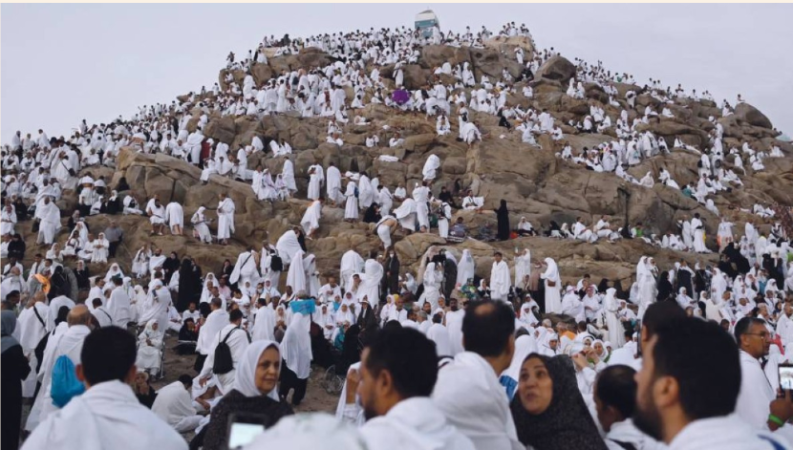His Eminence Sheikh Dr. Ahmed Al Haddad, Grand Mufti and Director of the Fatwa Department at the Islamic Affairs and Charitable Activities Department in Dubai, stated in an exclusive statement to Al Bayan that artificial intelligence programs, such as ChatGPT, offer significant benefits that are indispensable in today's advanced world. However, it is not permissible under Islamic law to rely on it for fatwas, especially on delicate matters such as Hajj rituals, expiations, and interpretation of the Holy Qur’an. Al-Haddad explained that these programs can only be used to approximate the information required, and then the original sources can be consulted, as these systems transmit the information they are provided with. This information may be inaccurate, and therefore, anyone who relies on it is like a woodcutter at night, not knowing what he is getting into, considering that it is a religious and rational duty to refer to the specialized and respected fatwa scholars, because God Almighty has commanded this in His saying: {So ask the people of the message if you do not know.} Full responsibility He emphasized that the mufti is accountable before God Almighty and before the people and is obligated to bear the consequences of his fatwa if he errs. However, technology bears no responsibility, and the responsibility rests entirely with the questioner himself, citing the hadith: "This knowledge is religion, so be careful from whom you learn your religion." Regarding cases where a pilgrim relies on an incorrect fatwa issued by artificial intelligence, resulting in failure to perform the ritual, Al-Haddad emphasized that the legal responsibility in such cases falls on the user, who will bear the legal penalty if they neglect an obligation or commit a prohibited act during ihram, as they relied on a source that is not legally or rationally authoritative. Regarding his opinion on the use of artificial intelligence tools in interpreting the Holy Quran, Al-Haddad explained that interpreting God’s words is only valid through well-known interpreters who base their work on a clear methodology based on tradition, language, and the general and specific objectives of Islamic law, based on the Almighty’s words: {And if they had referred it back to the Messenger or to those in authority among them, those among them who investigate it would have known about it}, explaining that those in authority here are the specialized scholars who interpret the words of God according to His meaning and the meaning of His Messenger, may God bless him and grant him peace. Specialists He emphasized that there is no objection to leveraging artificial intelligence to facilitate references, provided that the source is not considered a reliable source. Its outputs are based on the data entered into it, which may or may not be accurate, making referral to specialists an indispensable necessity. He continued: “Whoever speaks about the Qur’an based on his own opinion, let him take his seat in Hellfire.” The evidence for this is that most of the strife that has occurred among people is due to corrupt interpretations resulting from whims and from deviations from the principles of the scholars of interpretation. The Khawarij, both in ancient and modern times, rebelled against Muslims and their rulers with weapons because of their corrupt interpretations. This intelligence may be fueled by these incorrect interpretations, and if they are adopted, then the forbidden will occur, which must be avoided. Therefore, it is obligatory for anyone who wants to interpret the words of God Almighty in order to act upon them and understand them correctly to refer to the scholars and the approved books of interpretation. When asked about the legal risk of artificial intelligence providing an incorrect interpretation of a verse from the Holy Quran, or one that contradicts the Sunni approach, Al-Haddad emphasized that the risk in this case is very great if relied upon entirely, noting that AI inputs may not be in the hands of trusted specialists. He emphasized that anyone seeking a correct and actionable interpretation of God's words should consult scholars and authoritative books of interpretation. He also emphasized the need for official religious authorities to adopt legitimate artificial intelligence systems under scholarly supervision, particularly during major religious festivals such as the Hajj. Al-Haddad explained that this matter has become a necessity of the time, and that scientists and specialists must take advantage of this modern and advanced technology, which has become embedded in all aspects of life, provided that it is used properly. Benefit people He emphasized that anyone who can contribute to the benefit of people through this technology should take the initiative to do so, particularly in religious fields, so that it is not exploited by those who are not experts or those seeking to harm Islam and its people. He pointed to the experience of the Dubai Islamic Affairs Department, which established an electronic fatwa platform, through which a portion of the religious fatwas issued by the Fatwa Department were incorporated. He pointed out that this initiative is similar to what good people have done in the past, which is to prepare electronic encyclopedias of jurisprudence that benefited students of knowledge and facilitated their access to information, but the current technology is easier and more widely used. He emphasized that the International Islamic Fiqh Academy, at its 26th session recently held in Qatar, issued a general directive to Muslims urging them to utilize artificial intelligence and employ it in the service of their people and their countries. Sharia controls Regarding the legal controls required for the use of these technologies in fatwas, interpretations, or teaching Islamic sciences, Al-Haddad explained that every activity has its own controls set by specialists, whether the work is in the legal, medical, security, or other fields. He emphasized that fatwas, in particular, must be based on fatwas issued by reliable authorities in Islamic countries that take into account contemporary reality and future expectations. He cautioned against providing artificial intelligence with content that is inconsistent with or contradicts current realities. Regarding how to differentiate between what constitutes a legitimate facilitation through the use of AI and what might lead to misleading people or infringement on the authority of scholars, Al-Haddad emphasized that an informed, specialized user can distinguish between truth and falsehood and benefit from technology as a means of bringing information closer and facilitating access to it, rather than as a source upon which they can rely entirely. However, someone who is not academically qualified may not understand the difference between right and wrong, and in that case he will fall into the forbidden and be held responsible for that because he chose to acquire knowledge from people other than those qualified for it, without consulting specialists. General advice Al-Haddad offered general advice, saying, "I advise anyone who can benefit from these tools to take the initiative after mastering their use and being aware of their dangers. We are now in an age of technology, intelligence, and open space, and there is no consolation for those who fail to keep up with this era and all its positives." He emphasized that today's youth are the youth of industry and technology, and they must diligently and diligently take advantage of the facilities provided by the state, especially since the state has taken it upon itself to prepare this generation to be active in scientific and technological progress. It has established a special ministry for this purpose and has prepared educational and development programs for today's children so that they can be pioneers in the fields of useful intelligence and advanced technologies. He concluded by saying, "The present and future generations must appreciate this great attention from our leadership and engage positively with it so that they can achieve the aspirations of our leadership and our pioneering nation." A person who relies on artificial intelligence information is like a “night woodcutter” who doesn’t know what to take. The programs can only be used to approximate the required information. The Mufti is responsible before God and before the people and is obligated to bear the consequences of his fatwa if he makes a mistake.

